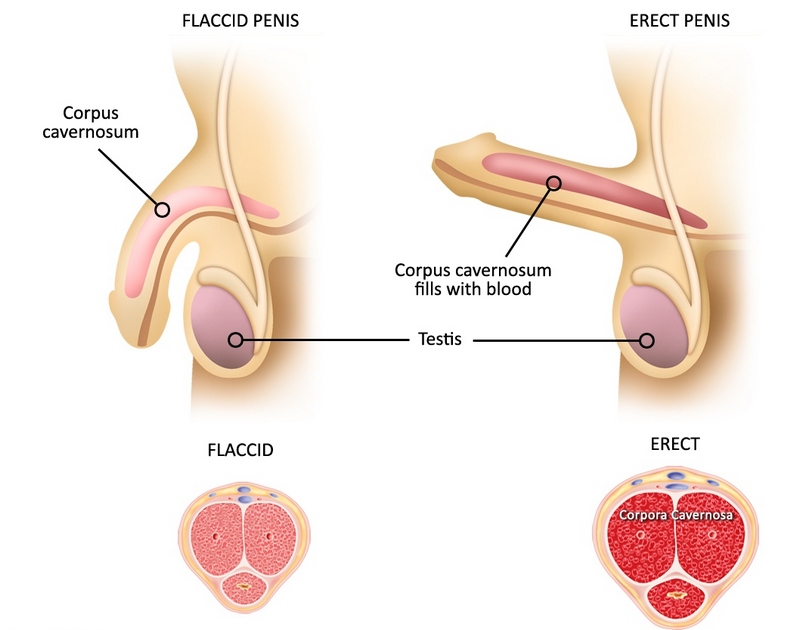Erectile dysfunction, the medical terminology for impotence, refers to inability in men to achieve an erection for sexual activity and intercourse. According to the American Urological Association, half of the American male population above the age of 45 suffer from ED in some form or the other.
The urologists treating this condition say that the causes of erectile dysfunction may be psychological or physical and in some cases both. Where physical causes account for 80-90% cases and psychological causes accounting for remaining 10-20% cases.
Continued research has widened treatment options for patients including surgery, injections, medications and sexual counseling.
Among the physical causes responsible for erectile dysfunction, the prime position goes to nerve damage. As per a Spanish study on 90 males, researchers found that nerve damage, specifically the peripheral nerve damage, is a major cause of 69% of the sexual problem. Although the study sample is small it reaffirms the correlation between sexual problems and nerve damage, underestimated by medical professionals in the past.
Understanding of how erection happens in the male body will help in understanding how nerve ends play an important role in erectile dysfunction.

Erection Mechanism
The brain holds the rein of sexual activity in the body. It is the center of coding and decoding of all the sexual stimulus and responses. To perform its action brain uses the nervous and vascular system, it depends on nerves to transmit electrical signal responsible for the sexual activity.
Nerves act as pathways between brain, spinal cord, and the penis. Nerves act by releasing a chemical substance called neurotransmitter in the penis to begin sexual activity. The electrical signals called nerve impulse first enter into two chambers of the penis called as corpora cavernosa, where nerve impulse relaxes penile tissues, and arteries expand because of increased blood flow, but the veins draining blood from the two chambers are compressed. This action results in penis erection.
On ejaculation, pressure on veins decreases, blood moves out of two chambers and penis retains its normal shape.
How nerve damage affects erection
Nerve damage of penile area is responsible for erectile dysfunction. Following Conditions may damage nerves
Vascular system disease
Cholesterol deposition in arteries causes heart diseases, but the heart is not the only organ which suffers from artery blockage, artery blockage in the brain causes stroke and in penile area cause erectile disorders.
Like artery, veins may also cause the disease. Due to nerve damage, when veins in two chambers of the penis, where blood is accumulated during erection, do not contract sufficiently to create required blood pressure for erection, patient experience a weak erection, blood leaks out of the cavernous chambers.
Metabolic diseases
Metabolic diseases like diabetes damage nerves and small blood vessels throughout the body, because of high blood glucose level, especially in the lower half of body.
Damaged nerves cannot transmit nerve impulse properly, thus patient suffers from erectile dysfunction. 50% of male in 35-50 age group having diabetes suffer from this sexual dosorder, whereas 50% of male above age 50 having diabetes become impotent.
Surgery in the pelvic region
Any surgery in the pelvic region may cause erectile dysfunction when it damages nerves relating to penile tissues. Surgery in colon, rectum, bladder or prostate mayor damage nerves carrying electrical impulses. For instance, prostate surgery to prevent cancer often damage penile nerves and lead to impotence. Safer techniques like da Vinci robotic surgery are coming up to protect nerves during such critical surgeries.
Conclusion
In the past, it was believed that the causes of erectile dysfunction are mainly psychological, but researchers are proving that physical causes are major factors behind this disorder.
A weak erection is a serious problem affecting millions of male worldwide. Massachusetts Male Aging Study found that 52% male in 40-70 age group suffered from In 1995, ED affected 2016 52 million men worldwide, the estimate for coming years is alarming. By 2025, 322 million men are expected to suffer from this disorder worldwide.
Nerve damage due to vascular diseases, diabetes-like metabolic disorders, and pelvic region surgeries leads to a weak erection. We need awareness and medical advancement to fight with this health disorder.



